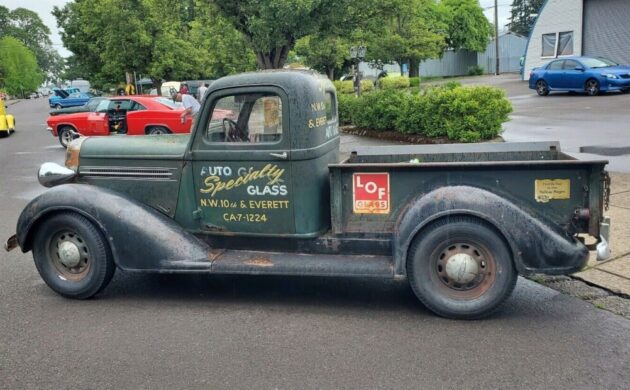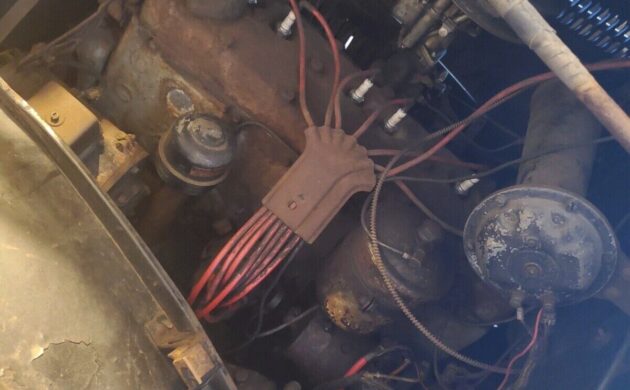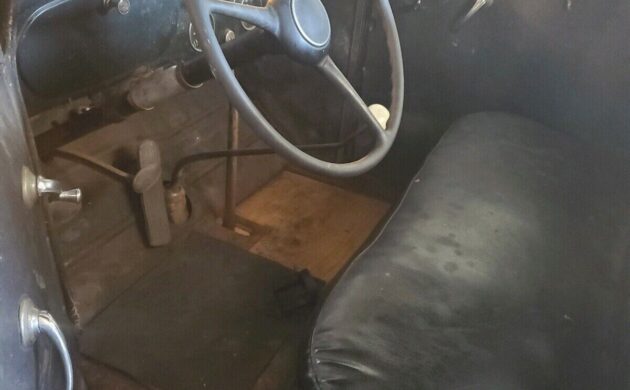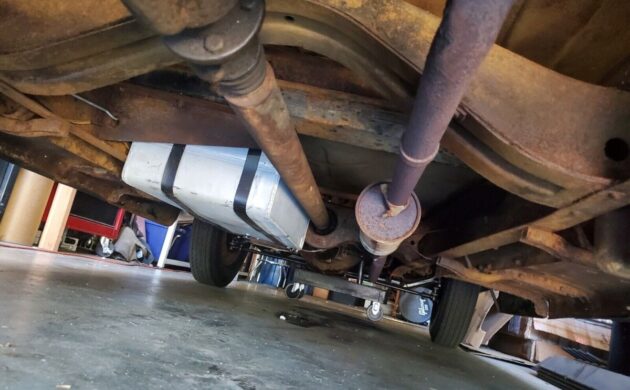By the 1930s, Dodge Brothers was owned by Chrysler, the Dodge brothers both having passed away in 1920. Changes were afoot as a new design for Dodge trucks was introduced in 1936, with streamlined hood and fender contours, and a bullnose grille following the rounded hood line. Already, Chrysler had ditched Dodge engines in favor of its Plymouth engines. Best of all, instead of a car chassis, Dodge introduced a purpose-built truck chassis. These trucks – like many of the day – were used by commercial enterprises as well as private owners. Here on eBay is a 1936 Dodge LC pickup, with brisk bidding up to $10,600, reserve not met and a Buy it Now of $20,000. This owner may take a trade. The truck is located in Eugene, Oregon, just down the road from the Portland home of its commercial owner, Specialty Auto Glass. The LC model is a half-ton truck. It is complete except for its spare tire and side mirrors.
The LC utilized the 201 cu. in. flathead six-cylinder motor paired with a downdraft carburetor making about 70 bhp. It has a three-speed floor shift manual transmission. The truck is said to run very well on back roads at 55 mph, though the owner indicates he wouldn’t take it on the freeway. A video of the motor running is provided. The owner has had the truck for five years and drives it daily. In fact, he just took it to a show where it won a prize.
The interior patina matches the rest of the truck – no rips, cracks, or missing parts, just good old-fashioned use. Rust is evident under the seats. The owner indicates that the fuel gauge is not working despite a new sending unit. The vacuum wiper motor also does not work. On the other hand, the front suspension has been rebuilt, as well as the brakes “front to back, except the pedal.”
The undercarriage is dry though replete with surface rust. Apparently, the gas tank has been painted, which might be interfering with the ground for that faulty fuel gauge. The glass looks great. But the best part about this truck is how it has survived as an authentic advertisement for a long-ago auto-related business. Other than mechanical upkeep, protecting the paint finish, and preventing existing rust from worsening, this truck could be a pretty simple “get in and drive” proposition. What’s the first thing you would do with it if it landed in your garage?







First thing I’d do is derust the wheels and put it back on the road. Then, as Michelle says, take care of that surface rust, even if it’s one area per weekend. On the off weekends take it out and have fun with it.
Taking care to preserve that great overall patina, I’d address all rust and roadworthiness issues. I would carefully match the shade and texture of any repainting to the existing original paint.
The chrome plating on the grille surround and headlight pods is non-original, something that was added later, probably when the company was renamed “Specialty” (maybe in the ’50s?), so I’d have to put them back to the body color. I would also replace the running board rubber with new.
What I would NEVER, EVER do is to “clear-coat” this truck!
Perfect! I agree on the clear coat – makes it look like plastic.
I had to double check to make sure the phone number on the door wasn’t “BR5-49″….
Wow, LOF glass (Libbey Owens Ford). Now Pilkington owns it.
Many people think the Ford in Libby-Owens-Ford refers to the Ford Motor Company, but the company name comes from the 1930 merger of the Libby-Owens glass company with the Edward Ford Plate Glass Company, Edward was not a close relation to Henry Ford.
Yeah, Ford has their own glass. Early on it was Fomoco, then it became Carlite.
It appears to have juice brakes. I thought even Dodge had mechanical until ’39? If it is like the competition of the day, first will be Granny, even in a three speed. I was given a ’37 Ford for two weeks of after school work with a man building his house. Wages of the time for a 16 year old was about $1.50 per, so when I got $200 for the truck about a month later I believed I had “won” the deal. What would a bone stock V8 flattie truck bring these days? Probably about as much as $200 invested in a mutual fund for 53 years.
All Dodge cars and trucks had hydraulic brakes since 1930. Your ’37 Ford would definitely be worth up to $25k today in nice, unrestored original condition. On the other hand, you came out ahead at the time! What 16 year old thinks 53 years ahead?
Plymouth had hydraulic brakes from its introduction in 1928. I would assume Dodge, DeSoto, and Chrysler vehicles had the same.
Everyone likes this jewel, so is it worth $20k ??
Given what needs fixing, no – it’s not worth $20k. Without that appealing Auto Glass Co. lettering, it would be worth maybe $10k, tops. But this one does have that going for it, so it could go for $13k – $15k. On the other hand, it only takes two buyers who’ve got plenty of money to fall in love with it and bid it up to $20k – you never know!
The only way to do this is to fix it up; give it a driver-quality restoration. There’s a guy from over in Spokane, with a ’38 model, who drives his truck faithfully and that’s including trips over a thousand miles one way. He’s had a few problems on the road but nothing he couldn’t fix.
Bidding is over 11K now with four days to go. Too bad about the missing spare wheel but I guess one could be sourced somewhere. Nice to see BOTH bumpers are intact; previous owners often remove them. Some pickups didn’t come with a rear bumper at all,except as an accessory.
One thing a new owner would have to do is fit a set of turn signals!